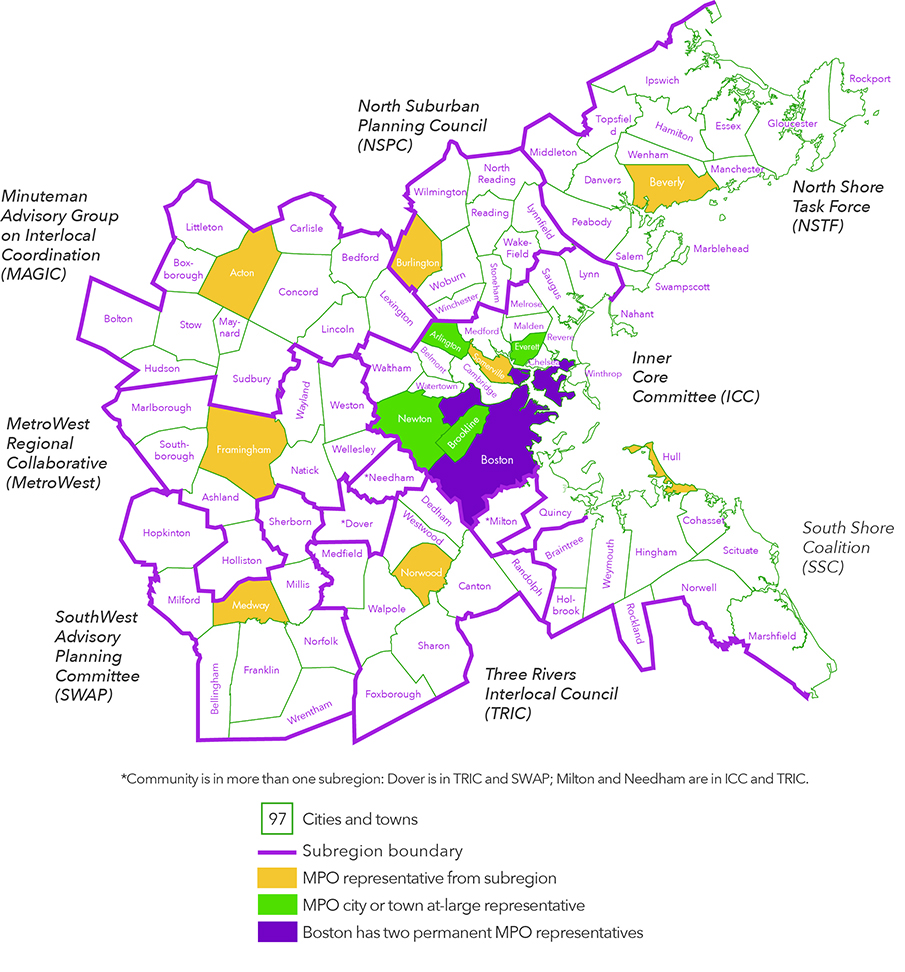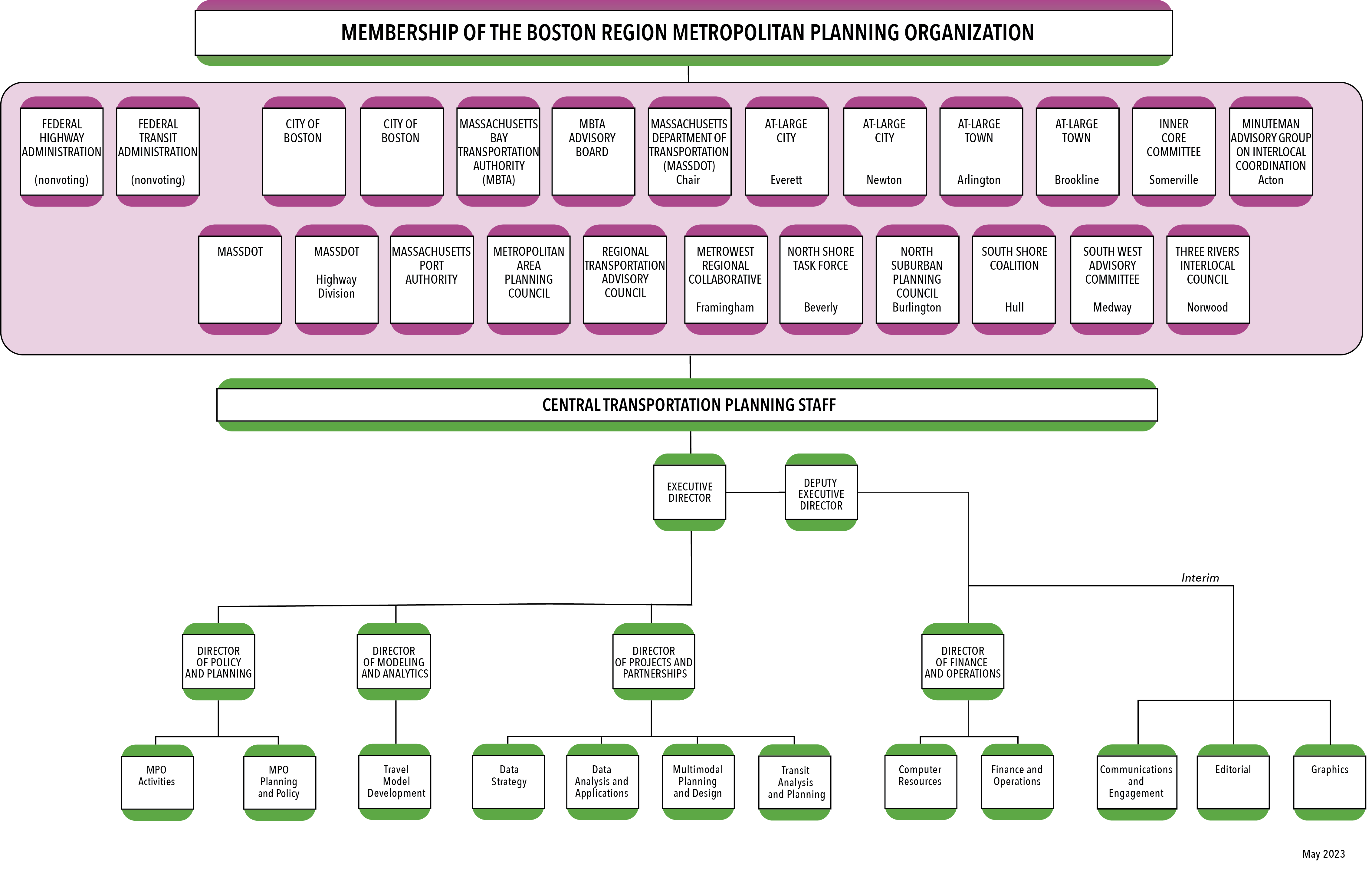

Metropolitan planning organizations (MPO) are responsible for providing forums for making decisions about how to allocate federal transportation funds for capital projects and planning studies in a metropolitan area. These decisions are guided by information and ideas collected from a broad group of people, including elected officials, municipal planners and engineers, transportation advocates, and interested residents. Each metropolitan area in the United States with a population of 50,000 or more—also known as an urbanized area—is required by federal legislation to establish an MPO for the area.
The Boston Region MPO’s planning area extends across 97 cities and towns from Boston north to Ipswich, south to Marshfield, and west to Interstate 495.
Figure ES-1 shows the map of the Boston Region MPO’s member municipalities.
Figure ES-1
Municipalities in the Boston Region

The MPO’s board has 22 voting members. Several state agencies, regional organizations, and the City of Boston are permanent voting members, while 12 municipalities are elected as voting members for three-year terms. Eight municipal members represent each of the eight subregions of the Boston region, and four represent at-large municipal seats. The Federal Highway Administration (FHWA) and Federal Transit Administration (FTA) participate on the MPO board as advisory, or nonvoting, members. More details about the MPO’s permanent members can be found in Appendix F.
Figure ES-2 details MPO membership and the organization of the Central Transportation Planning Staff (CTPS), which serves as staff to the MPO.
Figure ES-2
Boston Region MPO Organizational Chart

The federal government regulates the funding, planning, and operation of the transportation system through the federal transportation program, which was enacted into law through Titles 23 and 49 of the United States Code. The Federal-Aid Highway Act and the Federal Transit Act require that urbanized areas conduct a transportation planning process to be eligible for federal funds, resulting in plans and programs consistent with the planning goals of the metropolitan area.
The most recent reauthorization of the transportation law is the Bipartisan Infrastructure Law, which sets policies related to metropolitan transportation planning. The law requires all MPOs to carry out a continuing, comprehensive, and cooperative (3C) transportation planning process. As part of its 3C planning process, the Boston Region MPO annually produces the Transportation Improvement Program (TIP) and the Unified Planning Work Program (UPWP). These documents, along with the quadrennial Long-Range Transportation Plan (LRTP), are required for the MPO to be certified as meeting federal requirements. This certification is a prerequisite for receiving federal transportation funds. In addition to this requirement, the MPO must establish and conduct an inclusive public engagement process, as well as maintain travel models and data resources to support air quality conformity determinations, transportation equity analyses, and long- and short-range planning work and initiatives.
Appendix E explains the regulatory and legislative context in which the MPO operates in greater detail.
The 3C planning process is an approach for conducting meaningful transportation planning:
Chapter 1 explains the 3C process in greater detail.
The UPWP is a one-year planning document and financial plan that explains how the Boston region’s federal transportation planning funds will be spent in a given federal fiscal year (FFY).
The development of the UPWP involves the prioritization of all potential transportation planning programs, studies, and technical analyses that could be undertaken to benefit the region in a given year. The scopes and budgets of the prioritized work are documented in the UPWP. The aim is to ensure that the work undertaken by the MPO supports the region’s transportation goals, as established through the 3C process.
The UPWP serves as a source for the following information:
The Boston Region MPO plans for the transportation future of the Boston region. The MPO is guided by a 20-year vision for a modern, safe, equitable, sustainable, and technologically advanced transportation system for the region. This vision is described in the MPO’s current LRTP, Destination 2040. The transportation planning work funded through the UPWP is an integral part of achieving this regional vision.
The transportation goals of the Boston region, as defined in Destination 2040, are as follows:
The MPO is currently in the process of developing its next LRTP. The following paragraph is the MPO’s vision statement as approved in February 2023; this UPWP was developed to be consistent with this vision.
The Boston Region Metropolitan Planning Organization envisions an equitable, pollution-free, and modern regional transportation system that gets people to their destinations safely, easily, and reliably, and that supports an inclusive, resilient, healthy, and economically vibrant Boston region.
In addition to the LRTP and the UPWP, the MPO also produces the TIP for the Boston region. As the near-term capital investment plan of the MPO, the TIP describes and prioritizes transportation construction projects that are expected to be implemented during the upcoming five-year period. Figure ES-3 illustrates the relationship between the LRTP vision and goals; the planning foundation for the MPO’s work, the UPWP; the TIP; and the process for monitoring and evaluating progress towards achieving the region’s goals.
The total federal funding programmed in this UPWP is $7,116,954. All federal funds programmed in the UPWP are allocated to the Boston Region MPO by the Massachusetts Department of Transportation (MassDOT) as FHWA 3C Planning (PL) funds. All federal funds programmed in the UPWP are allocated to the Boston Region MPO by the Massachusetts Department of Transportation (MassDOT) using its apportionment of the core federal formula funding source known as Metropolitan Planning Funds. There are two categories of funds. Federal funds originating from FHWA, known as FHWA 3C Planning funds, are distributed across MPO regions using a formula developed by the Massachusetts Association of Regional Planning Agencies. Federal funds originating from the FTA are known as FTA 3C Planning (Section 5303) funds. Both FHWA 3C Planning funds and FTA 3C Planning funds programmed in this UPWP include a state match. Since 2019, MassDOT has transferred Section 5303 funds from FTA to FHWA to be administered as a Consolidated Planning Grant. For more detailed information on funding sources and breakdowns, please see Chapter 2.
In addition to MPO-funded work, CTPS performs planning analyses and studies funded by state transportation agencies, including MassDOT, the Massachusetts Bay Transportation Authority (MBTA), and the Massachusetts Port Authority (Massport). More detail about these agency-funded studies can be found in Appendix A.
The UPWP contains detailed information about work programs, studies, support activities, and technical analyses that are organized in the following categories:
Table ES-1 contains the budget allocated for the MPO’s 3C planning activities in FFY 2024. The table reflects the FHWA metropolitan PL funds and FTA Section 5303 funds, which CTPS and Metropolitan Area Planning Council (MAPC) expect to spend in FFY 2024. The table also reflects the work that CTPS will conduct with funds provided by other transportation agencies.
Chapters 3 through 5 provide detailed information about the transportation-planning activities that will be performed by CTPS during FFY 2024. The new studies chosen for funding in FFY 2024 are summarized below in Table ES-2 and described in more detail in Chapter 4.
Table ES-1
Unified Planning Work Program Budget for FFY 2024
| 3C Studies and Programs by Budget Categories | Proposed FFY 2024 CTPS Budget |
| Resource Management and Support Activities | $425,500 |
| MPO Certification Requirements | $4,575,486 |
| Ongoing MPO-Funded Technical Analyses | $146,700 |
| New MPO-Funded Discrete Studies | $150,000 |
| MassDOT-Directed PL Funds* | $359,326 |
| Direct Support | $285,000 |
| Total FFY 2024 CTPS Budget | $5,942,012 |
| 3C Studies and Programs by MAPC Budget Categories | Proposed FFY 2024 MAPC Budget |
| MAPC Planning Studies and Technical Analyses | $769,942 |
| MAPC Administration, Resource Management, and Support Activities | $545,000 |
| Total MAPC FFY 2024 UPWP Programmed Funds | $1,314,942 |
| Agency Supporting MPO/3C Work | Proposed FFY 2024 Budget |
| CTPS | $5,942,012 |
| MAPC | $1,314,942 |
| 3C Budget Subtotal | $7,256,954 |
| FFY 2024 UPWP Budget | $7,256,954 |
Note: This budget includes salary, overhead, and direct support costs.
* Projects in this category are conducted on behalf of MassDOT but funded through the MPO 3C contract.
Table ES-2
New Discrete Funded Studies in FFY 2024
| Universe ID | Project ID | Study or Program | Proposed FFY 2024 CTPS Budget |
| M-1 | 14001 | Lab and Municipal Parking Phase II | $45,000 |
| A-1 | 14002 | Parking in Bike Lanes: Strategies for Safety and Prevention | $20,000 |
| R-2 | 14003 | Strategies for Environmental Outreach and Engagement | $25,000 |
| TE-1 | 14004 | Applying Conveyal to TIP Project Scoring | $60,000 |
| Total for New Discrete Studies | blank | blank | $150,000 |
The annual process of creating the UPWP includes both generating and evaluating ideas for new studies, as well as updating the scopes and anticipated deliverables for ongoing programs, technical analysis activities, certification requirements, and administrative support activities.
Ideas for studies, technical analysis activities, and deliverables for ongoing programs come from a combination of the following resources:
Ideas for new studies are compiled into the Universe of Proposed Studies. Each proposal is evaluated based on how it would help the region accomplish the LRTP goals. In selecting the final list of studies, the UPWP Committee also considers the utility of the projected study results to MPO stakeholders; whether sufficient staff resources are available to execute the needed work; and whether the work to be carried out is coordinated, rather than redundant, with work being done in other agencies.
The MPO continually seeks to improve its process through inclusive and collaborative decision-making. For this reason, the MPO seeks to involve a broad and diverse range of stakeholders throughout the UPWP development process.
MPO staff will continue to seek public input for ideas for the Universe of Proposed New Studies and engage participants in discussing, evaluating, and eventually prioritizing studies for inclusion in the UPWP. Staff will also continue to monitor and enhance the MPO’s communication channels, such as those listed below:
Toward the end of the document development process, the MPO votes to release for public review a draft UPWP. MPO staff posts the document on the MPO’s website (www.bostonmpo.org) and publicizes its release via an email distribution list that includes municipal contacts, interested members of the public, and other stakeholders in the region, and via social media. Email messages inform stakeholders about upcoming opportunities for public review and involvement in MPO decision-making. MPO staff also solicit public input during open houses, meetings with stakeholders, and at public events hosted by the MPO or its transportation partners (including MassDOT and the MBTA). MPO staff compile comments made during the public review period and present them to the MPO board. The public comment period for the FFY 2024 UPWP began on June 16th and ended on July 7th. Information about the public review process for the Draft FFY 2024 UPWP is provided in Appendix B.
The MPO monitors the progress of programs and studies funded through the UPWP by performing the following tasks:
This UPWP document is structured as follows: